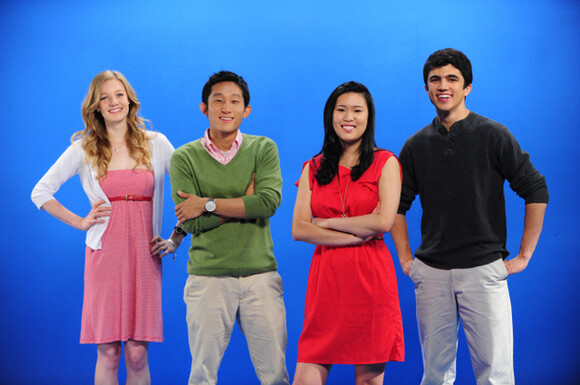hankyoreh
Links to other country sites 다른 나라 사이트 링크
Harvard students marvel at lonely, hard-studying Korean students

By Eum Sung-won, staff reporter
“Korean students just stay cooped up in tiny dorm rooms all the time studying, never talking to each other. I feel so bad to see them struggling on their own like that.”
Elite students in the US expressed bafflement at Korean students’ study habits.
Four Harvard University students and alumni appearing in the KBS documentary “The Studying Human” - Jennifer Martin, 22, Scott Yim, 23, Lillian Margolin, 25, and Brian Cowder, 22 - said study in South Korea appeared to be a lonely, joyless, and overly uniform process. The documentary is scheduled to air in early March.
The students joined the producers in May 2011 for a trip to places like South Korea, China, Israel, India, and the United Kingdom to see how students there studied and what cultural characteristics accounted for the differences. For their visit to South Korea, they met students at Seoul National University and after-school academies in the Daechi neighborhood of Seoul‘s Gangnam district, considered the most academically rigorous in the country.
The producers chose Harvard for its racial and cultural diversity, holding interviews and auditions to select the final four participants.
The students sat down with the Hankyoreh on Jan. 8 at the KBS network offices in Yeouido to talk about their experience.
Yim, a Korean-American, said the young students at the Daechi academies seemed to be struggling alone.
Martin mentioned an introverted South Korean friend at her dormitory who studied alone but was unable to cope with the school’s classes and their emphasis on creative thinking.
According to Cowder, South Korean students seemed to focus more on memorizing facts from books in cases where the important thing was to consider why the author wrote them.
However, he also noted a positive difference in the South Korean environment, saying that while American parents seemed to push their children to study only if they showed a talent for it, and educated them in other skills if they didn‘t, South Korean parents uniformly emphasized education, resulting in a higher average level of scholastic ability.
The Harvard students also said the South Korean students’ approach to their studies was odd from a US perspective. In particular they said that the students in South Korea seemed mainly to study for the benefit of their families or country, contrasting with US students who studied for their own sense of personal achievement.
They also agreed that South Korean students seemed to be uncomfortable with receiving help from people and feel wounded when they failed to meet some standard, making them extremely sensitive about their grades and scared of asking questions.
Margolin and Martin, who talked to ten parents of students at Daechi academies, said they seemed to be sending their children there more out of anxiety than a desire to improve their abilities.
The two students were particularly shocked to see that elementary school students in Daechi were not allowed to make friends if they didn‘t study, and that their parents believe playing with less intelligent children would make their children less intelligent.
Martin blamed this on an environment where academic performance is seen as the sole metric for determining people’s abilities, saying less accomplished students in the US could still find a good job in a different field.
Please direct questions or comments to [english@hani.co.kr]

Editorial・opinion
![[Column] Has Korea, too, crossed the Rubicon on China? [Column] Has Korea, too, crossed the Rubicon on China?](https://flexible.img.hani.co.kr/flexible/normal/500/300/imgdb/original/2024/0419/9317135153409185.jpg) [Column] Has Korea, too, crossed the Rubicon on China?
[Column] Has Korea, too, crossed the Rubicon on China?![[Correspondent’s column] In Japan’s alliance with US, echoes of its past alliances with UK [Correspondent’s column] In Japan’s alliance with US, echoes of its past alliances with UK](https://flexible.img.hani.co.kr/flexible/normal/500/300/imgdb/original/2024/0419/2317135166563519.jpg) [Correspondent’s column] In Japan’s alliance with US, echoes of its past alliances with UK
[Correspondent’s column] In Japan’s alliance with US, echoes of its past alliances with UK- [Editorial] Does Yoon think the Korean public is wrong?
- [Editorial] As it bolsters its alliance with US, Japan must be accountable for past
- [Guest essay] Amending the Constitution is Yoon’s key to leaving office in public’s good graces
- [Editorial] 10 years on, lessons of Sewol tragedy must never be forgotten
- [Column] A death blow to Korea’s prosecutor politics
- [Correspondent’s column] The US and the end of Japanese pacifism
- [Guest essay] How Korea turned its trainee doctors into monsters
- [Guest essay] As someone who helped forge Seoul-Moscow ties, their status today troubles me
Most viewed articles
- 1[Column] The clock is ticking for Korea’s first lady
- 2After 2 months of delayed, denied medical care, Koreans worry worst may be yet to come
- 3[Column] Has Korea, too, crossed the Rubicon on China?
- 4US overtakes China as Korea’s top export market, prompting trade sanction jitters
- 5[Editorial] When the choice is kids or career, Korea will never overcome birth rate woes
- 6[Correspondent’s column] In Japan’s alliance with US, echoes of its past alliances with UK
- 7[Photo] Smile ambassador, you’re on camera
- 8Hong Se-hwa, voice for tolerance whose memoir of exile touched a chord, dies at 76
- 9Nearly 1 in 5 N. Korean defectors say they regret coming to S. Korea
- 10Strong dollar isn’t all that’s pushing won exchange rate into to 1,400 range